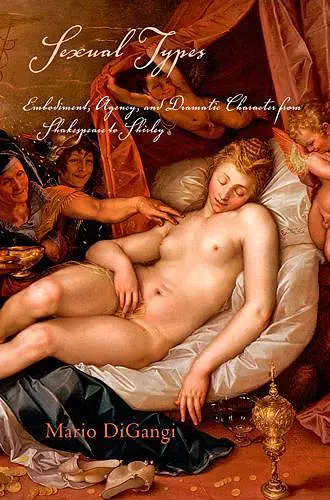Sexual Types
Embodiment, Agency, and Dramatic Character from Shakespeare to Shirley
Format:Hardback
Publisher:University of Pennsylvania Press
Published:20th Oct '11
Currently unavailable, and unfortunately no date known when it will be back

Sexual Types focuses on six figures from the early modern stage—the sodomite, the tribade, the narcissistic courtier, the citizen wife, the bawd, and the court favorite—that reveal in particularly compelling ways, how sexual transgressions were understood to intersect with social, gender, economic, and political transgressions.
Sexual Types focuses on six figures from the early modern stage-the sodomite, the tribade, the narcissistic courtier, the citizen wife, the bawd, and the court favorite-that reveal in particularly compelling ways, how sexual transgressions were understood to intersect with social, gender, economic, and political transgressions.
Sexual types on the early modern stage are at once strange and familiar, associated with a range of "unnatural" or "monstrous" sexual and gender practices, yet familiar because readily identifiable as types: recognizable figures of literary imagination and social fantasy. From the many found in early modern culture, Mario DiGangi here focuses on six types that reveal in particularly compelling ways, both individually and collectively, how sexual transgressions were understood to intersect with social, gender, economic, and political transgressions.
Building on feminist and queer scholarship, Sexual Types demonstrates how the sodomite, the tribade (a woman-loving woman), the narcissistic courtier, the citizen wife, the bawd, and the court favorite function as sites of ideological contradiction in dramatic texts. On the one hand, these sexual types are vilified and disciplined for violating social and sexual norms; on the other hand, they can take the form of dynamic, resourceful characters who expose the limitations of the categories that attempt to define and contain them. In bringing sexuality and character studies into conjunction with one another, Sexual Types provides illuminating new readings of familiar plays, such as Shakespeare's A Midsummer Night's Dream and The Winter's Tale, and of lesser-known plays by Fletcher, Middleton, and Shirley.
"DiGangi is the early modern literary critic perhaps best equipped to deal with the intersections among sexuality, gender, and status hierarchies, and Sexual Types has important things to say about how such relations function in drama from the late sixteenth century through the Caroline period. A significant contribution to both early modern drama studies and sexuality studies." * Valerie Traub, University of Michigan *
ISBN: 9780812243611
Dimensions: unknown
Weight: unknown
304 pages